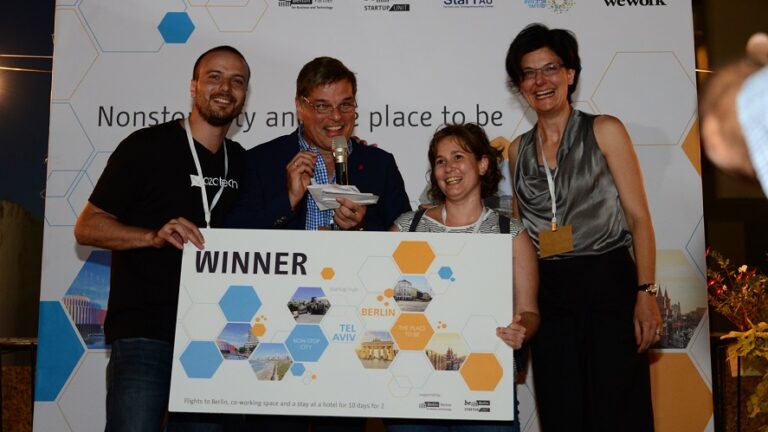
Aziz Kaddan, one of the co-founders of Myndlift, didn’t flinch when asked in front of an audience of global entrepreneurs and scientists at the recent BrainTech conference in Tel Aviv how he plans to go up against the better-funded American companies with his alternative non-drug treatment for attention deficit disorder (ADD) and attention deficit hyperactivity disorder (ADHD).
Myndlift uses neurofeedback, also known as electroencephalographic (EEG) biofeedback, to train the brain to focus. It’s a computer-based technique developed and tested by NASA to improve attention, focus and learning.
Kaddan, the 22-year-old phenomenon taking Israel’s brain-tech world by storm, knows the path to changing hyperactivity treatment is a tough one but he’s positive his app-based, wearable neurofeedback solution, coupled with specially tailored mobile games that only work through concentration, can increase attention levels with just 10 minutes of play time a day.
“I know that I have a product that has a value to a lot of people,” he tells ISRAEL21c, from his co-working space for high-tech entrepreneurship and innovation at Tel Aviv’s public library.
“You still see parents giving their children ADHD medications instead of giving them neurofeedback training.”
Myndlift’s idea is to get sufferers of ADD and ADHD off medications like Ritalin, which suppresses appetite and has other negative side effects, and help them focus their minds using a mobile app, neurofeedback and a brain-sensing wearable technology.
“Myndlift brings personalized neurofeedback training to mobile, making it easier for people with hyperactivity, professionals in demanding careers, students, athletes and anyone concerned about brain fitness to improve concentration abilities effectively without prescription drugs, inconvenience to visit specialized clinics and huge bills, thus saving thousands of dollars and tens of commuting hours.
Using wearable and mobile technology, brainwave therapy becomes affordable, accessible, and safe,” according to the company’s elevator pitch.
Kaddan and cofounder Anas Abu Mukh believe their medical technology will not only disrupt current treatment for attention deficit disorders but also impact the wider healthcare market worldwide.
Strokes of brilliance
In 2010, at age 17, Kaddan founded Kaddan Neuro Solutions (KNS) – a company specializing in providing computerized battery tests for ADHD diagnosis in Arabic. Though he moved on, the company is still operating.
In 2013, he joined E4D Mobile as a software engineer, and picked up experience in Android development.
“There’s no importance to race, age, sex or ethnicity in entrepreneurship. My mission is to inspire people,” says Kaddan.
While his father, a neurologist, wanted him to be a doctor, and his friends and neighbors advised him to stay with his well-paying high-tech job, in the middle of last year Kaddan quit his job and formed a startup with his friend, Abu Mukh.
Kaddan and Abu Mukh, both of whom secured computer science degrees by the time they were 19 years old, officially launched their brain-tech startup in 2014.
“We understood that we wanted to do something with more responsibility, something more meaningful,” says Kaddan.
Kaddan’s idea for Myndlift came from two sources: Mostly from watching the negative side effects his brother and sister (now 16 and 21, respectively) had to deal with when taking Ritalin, an amphetamine-like central nervous system stimulant used to treat ADHD.
But he also credits his own lack of focus during a failed job interview at Google as a force to change how the healthcare world deals with concentration.
As the son of a neurologist, Kaddan knew that research on neurofeedback training showed promising results as an alternative for treating ADHD.
“Neurofeedback has existed for more than 20 years and a lot of research shows really high success rates. Yet, you still see parents giving their children ADHD medications instead of giving them neurofeedback training. And the reason for this is neurofeedback is expensive and it’s not accessible,” he tells ISRAEL21c.
“You need to go to the clinic at least 12 times a year and pay thousands of dollars to get the full training. And that doesn’t sound attractive to most parents. What’s unique about our product is that we brought neurofeedback from the clinic to the home. You can train anywhere, anytime.”
Before they even had time to settle into a work routine, the two guys from the village of Baqa al-Gharbiya near Hadera were selected among 128 finalists of more than 1,600 startups to apply to the MassChallenge 2014 Accelerator Program in Boston.
In Boston, Kaddan and Abu Mukh met Dr. Naomi Steiner, a developmental behavioral pediatrician who has helped them develop the product.
“It’s not yet possible to compare their app to the big, professional systems on the market. Myndlift’s software was planned to afford more flexibility, which means that it will be possible to use different hardware systems, so they will be able to integrate improvements in the future as well. This is the way to do business today,” Steiner told Globes.
Before returning to Israel, the Myndlift team – which today includes four team members and a few advisers – was already in hot demand by medical innovation leaders and at brain-technology conferences.
No time to wander off
Myndlift uses a Musebrain-sensing headband and mobile video games that improve focus. The headset will set patients back a few hundred dollars but the app is free, and the premium version of the app is just $15.
While friends urged Kaddan and Abu Mukh to up the price, the two founders believe that to keep this solution accessible it has to stay cheap.
The games they have available so far include a race between two characters – the user’s and the computer’s. The user’s stick figure moves according to the user’s concentration level.
In their short company lifespan, Kaddan and Abu Mukh have already chalked up an interview with the Y Combinator accelerator, though they weren’t accepted, because, as Kaddan says, “they claimed that the solution won’t reach billions of dollars. I disagree, but it is their decision.”
They are now immersed in R&D, developing iOS and Android apps and adding new games– tested by Kaddan’s siblings and 20 pilot participants.
“Neurofeedback is proven,” says Kaddan. “We want to prove that even if you do neurofeedback for shorter sessions on your mobile phone it still gets significant results.”
For more information, click here.
















